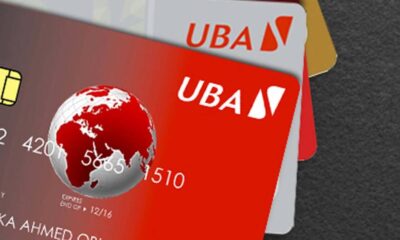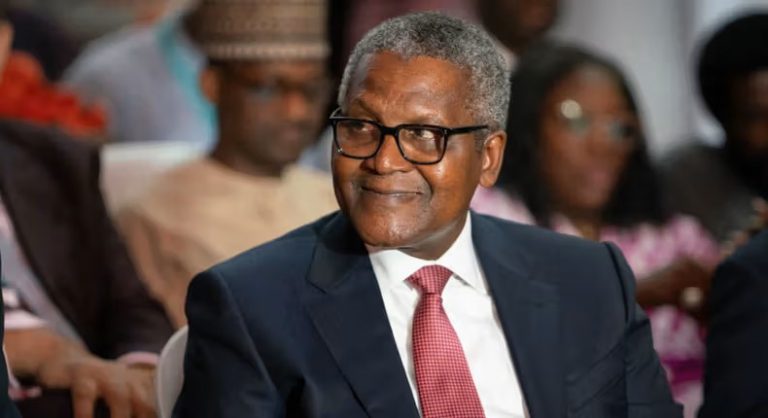The President of the Dangote Group, Alhaji Aliko Dangote, urged President Bola Tinubu to include refined petroleum products on the list of items restricted under the ‘Nigeria First’ policy of the Federal Government. However, oil marketers and industry analysts opposed the proposal on Sunday.
The ‘Nigeria First’ policy restricts government agencies from importing goods that can be produced locally. In May, Tinubu instructed that agencies should not procure foreign goods or services already available in Nigeria unless they obtain a waiver from the Bureau of Public Procurement.
Speaking at the Global Commodity Insights Conference on West African Refined Fuel Markets—organized by the Nigerian Midstream and Downstream Petroleum Regulatory Authority in collaboration with S&P Global Insights—Dangote called for petrol, diesel, and other refined petroleum products to be added to the policy’s restricted items.
He argued that fuel importation undermines local refining and discourages further investment in the sector and economy. He called on African governments to adopt protective measures similar to those of the United States, Canada, and the European Union to defend domestic producers from “unfair competition”.
Dangote emphasized that the “Nigeria First policy announced by His Excellency, President Bola Tinubu, should apply to the petroleum product sector and all other sectors.”
His proposal aimed to restrict imports of petrol, diesel, and other locally refined products. He stated that local refiners struggle to sell their products due to what he termed as dumping. He accused importers of flooding the market with toxic fuel unfit for sale in Europe.
“And to make matters worse, we are now facing increased dumping of cheap, often toxic petroleum products, some of which are blended to substandard levels that would never be allowed in Europe or North America,” he said.
He also noted that some of these imports include fuel or crude oil subsidised in Russia, which distorts local pricing and forces refiners to sell below cost.
“Due to the price caps on the Russian petroleum products, discounted petroleum products produced in Russia or with discounted Russian crude find their way to Africa, severely undercutting our local production, which is based on full crude pricing. This has created an unlevel playing field in most African countries. Petrol and diesel are sold for about a dollar net of taxes.
“In Nigeria, due to this unfair competition, this price is just about 60 cents, even cheaper than Saudi Arabia, which produces and refines its own oil. This is due to the fact that we are having too much dumping. To remain viable, we urge the governments across Africa to take deliberate steps as the United States, Canada, and the European Union have done to protect domestic producers from unfair competition,” he stated.
Dangote clarified that this move was not about monopolising the sector but encouraging local investment. He criticised wealthy Nigerians for investing abroad while criticising those building within the country.
“Let me take this opportunity to address concerns around monopoly and dominance. The reality is that too many people who have the means and the opportunity to contribute meaningfully to our nation’s growth choose instead to criticise from the sidelines while investing their wealth abroad,” Dangote said.
He revealed that his $20bn refinery has exported approximately 1.35 billion litres of petrol within 50 days, positioning Nigeria as a net exporter of petroleum products.
“Today, Nigeria has actually become a net exporter of refined products. Before I came on the podium, I asked my people how many tonnes of PMS we have actually exported. From June beginning to date, we have exported about 1 million tonnes of PMS, within the last 50 days,” he said.
Marketers tackle Dangote
Oil marketers rejected Dangote’s request, urging the government to continue allowing fuel importation.
The National Publicity Secretary of the Independent Petroleum Marketers Association of Nigeria, Chinedu Ukadike, told our correspondent that banning imports would damage the sector.
“We independent marketers will depart from that request. If the government does that, that means we will not be able to check inflation and monopoly, since it is the only refinery operating in the country now. We should continue to import even as we buy locally.
“I heard that the NMDPRA stated clearly that Dangote cannot produce all the fuel that the country needs. We will appreciate it if the country allows importation to continue since we are not paying subsidy,” Ukadike said.
Responding to Dangote’s claim that importation would harm local businesses, Ukadike disagreed. “Importation won’t kill local businesses or refineries; it will strengthen them. It will ensure local refineries step up their game. I don’t agree with Dangote on this,” he said.
The National President of the Petroleum Products Retail Outlet Owners Association of Nigeria, Billy Gillis-Harry, also opposed banning fuel imports. He argued that a free economy must avoid monopolies and maintain diverse energy sources.
“I don’t agree with Dangote. We are running a free economy. There’s no reason why any one company should have an overarching value on the entire industry.
“Importation is not killing the economy. Importation is stabilising the sources of petroleum products. Importation of all products is useful. However, those that can be produced in Nigeria, like toothpicks, garri, egusi soup, cassava, and others like that, should be banned.
“But importation of refined petroleum products should not be banned because it helps to ensure that there are multiple sources of energy and replenishment,” Gillis-Harry stated.
Expert reacts
Professor Dayo Ayoade from the University of Lagos warned that banning petroleum imports could lead to monopolistic control.
“No, we cannot have a ban on petroleum imports. It’s not a legal ban. That would not be acceptable because we don’t have diverse sources for petroleum products. We can’t rely solely on the Dangote refineries. That would give a monopoly to a private individual.
“And for the reasons of energy security and national security, that would be completely unacceptable. The government should continue to encourage, liberalise, and ensure other refineries come upstream. NNPC may want to privatise or sell off its refineries, then that’s fine. But we need to have a better base of product market before we now start to say we want to ban imports,” he said.
He added that international trade law doesn’t support outright bans.
“And you know, when we talk about bans, we have to look at international trade. International trade law does not really sit well with banning things. So, we have to be clever about how we do it. But if the market is ripe, it will be more expensive to bring in things from other countries than our own products, provided they are of sufficient quantity and the quality is fine,” the don submitted.
More refineries
At the NMDPRA conference, Dangote called for more refineries and urged the withdrawal of dormant licences.
The IPMAN spokesman agreed. “On that side, I agree with him. You can’t obtain a licence to build a refinery and use it to decorate your house. The nation needs more refineries to do more exports.”
Dangote reiterated that his refinery could meet Nigeria’s fuel needs and said efforts to undermine the facility through importation were harmful. He revealed the refinery is targeting 700,000 barrels per day capacity by December, up from the current 650,000 BPD.
Last Friday, Dangote stepped down as Director and Chairman of Dangote Cement’s Board of Directors. The Group’s Chief Branding & Communications Officer, Anthony Chiejina, said he was focusing on the $20bn refinery, petrochemicals, fertiliser, and government relations.
The refinery is currently receiving 4,000 compressed natural gas-powered trucks for its free fuel delivery scheme starting August 1. The initiative will provide petrol, diesel, and aviation fuel directly to filling stations and bulk users such as telecom companies.
Credit: The Punch

 BIG STORY2 days ago
BIG STORY2 days ago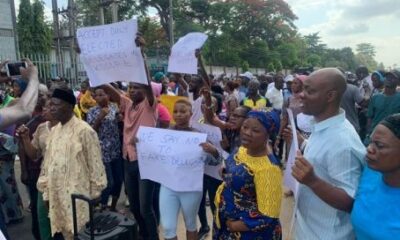
 BIG STORY2 days ago
BIG STORY2 days ago
 BIG STORY2 days ago
BIG STORY2 days ago
 BIG STORY2 days ago
BIG STORY2 days ago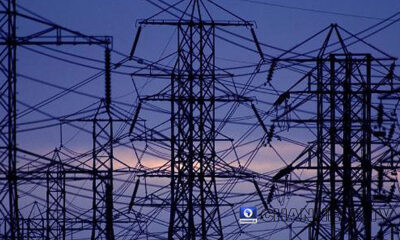
 BIG STORY2 days ago
BIG STORY2 days ago
 BIG STORY2 days ago
BIG STORY2 days ago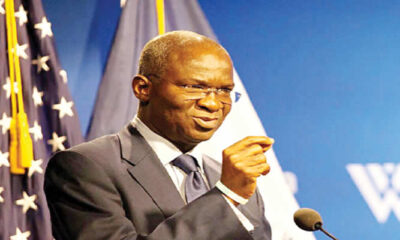
 BIG STORY11 hours ago
BIG STORY11 hours ago
 BIG STORY2 days ago
BIG STORY2 days ago










